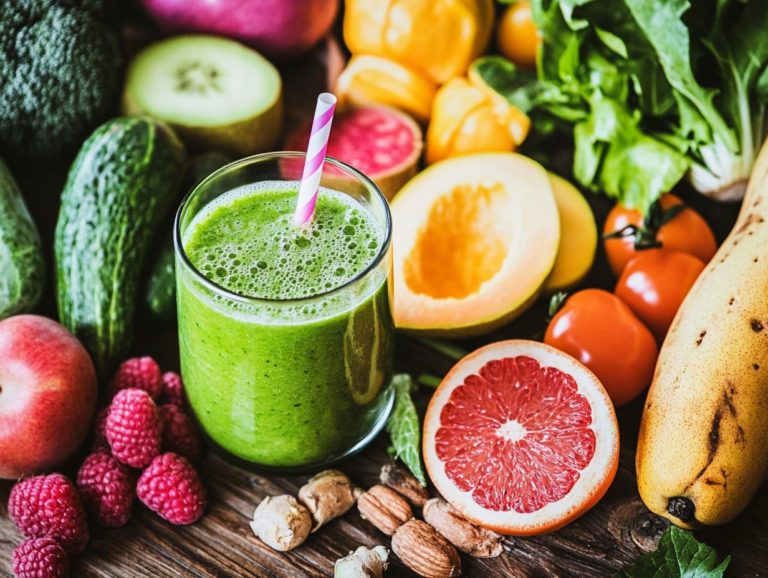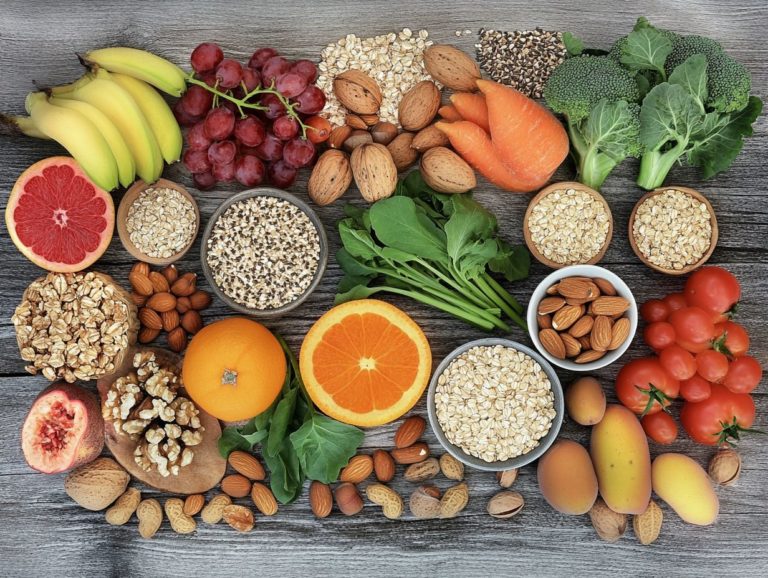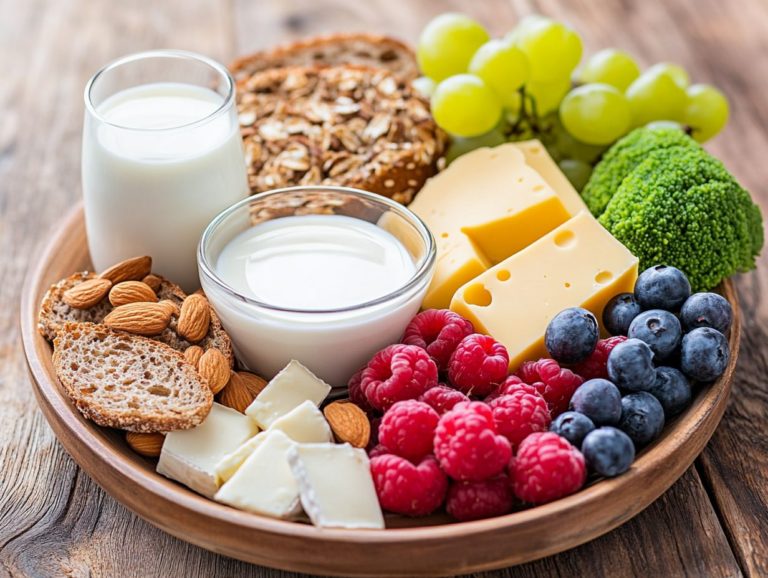Top 7 Lactose-Free Dairy Alternatives
In today s world, lactose intolerance is a prevalent concern for many. This has led to a quest for delightful and nutritious dairy alternatives.
Discover a wide array of options, from creamy soy milk to nutty almond milk. Each alternative boasts its own unique flavor and texture. This article explores the top seven lactose-free dairy alternatives, highlighting their health benefits and how they compare to traditional cow’s milk.
You ll also find practical tips for seamlessly incorporating these alternatives into your diet.
Moreover, potential drawbacks will be discussed, ensuring you can make well-informed choices. Whether you re navigating lactose intolerance or exploring plant-based options, this exploration offers something for everyone.
Contents
- Key Takeaways:
- 1. Soy Milk
- 2. Almond Milk
- 3. Coconut Milk
- 4. Oat Milk
- 5. Rice Milk
- 6. Hemp Milk
- 7. Cashew Milk
- What Is Lactose Intolerance and How Does It Affect People?
- What Are the Symptoms of Lactose Intolerance?
- What Are the Benefits of Choosing Lactose-Free Dairy Alternatives?
- How Do These Dairy Alternatives Compare to Cow’s Milk in Terms of Nutrition?
- What Are Some Tips for Incorporating These Alternatives Into Your Diet?
- Are There Any Drawbacks to Choosing Lactose-Free Dairy Alternatives?
- Frequently Asked Questions
- What Are the Top 7 Lactose-Free Dairy Alternatives?
- What Is Lactose Intolerance and Why Do People Choose Lactose-Free Dairy Alternatives?
- Are Lactose-Free Dairy Alternatives Suitable for Vegans?
- Can Lactose-Free Dairy Alternatives Be Used in Cooking and Baking?
- Are Dairy Alternatives a Healthier Choice for You?
- Are Lactose-Free Dairy Alternatives More Expensive Than Regular Dairy Products?
Key Takeaways:
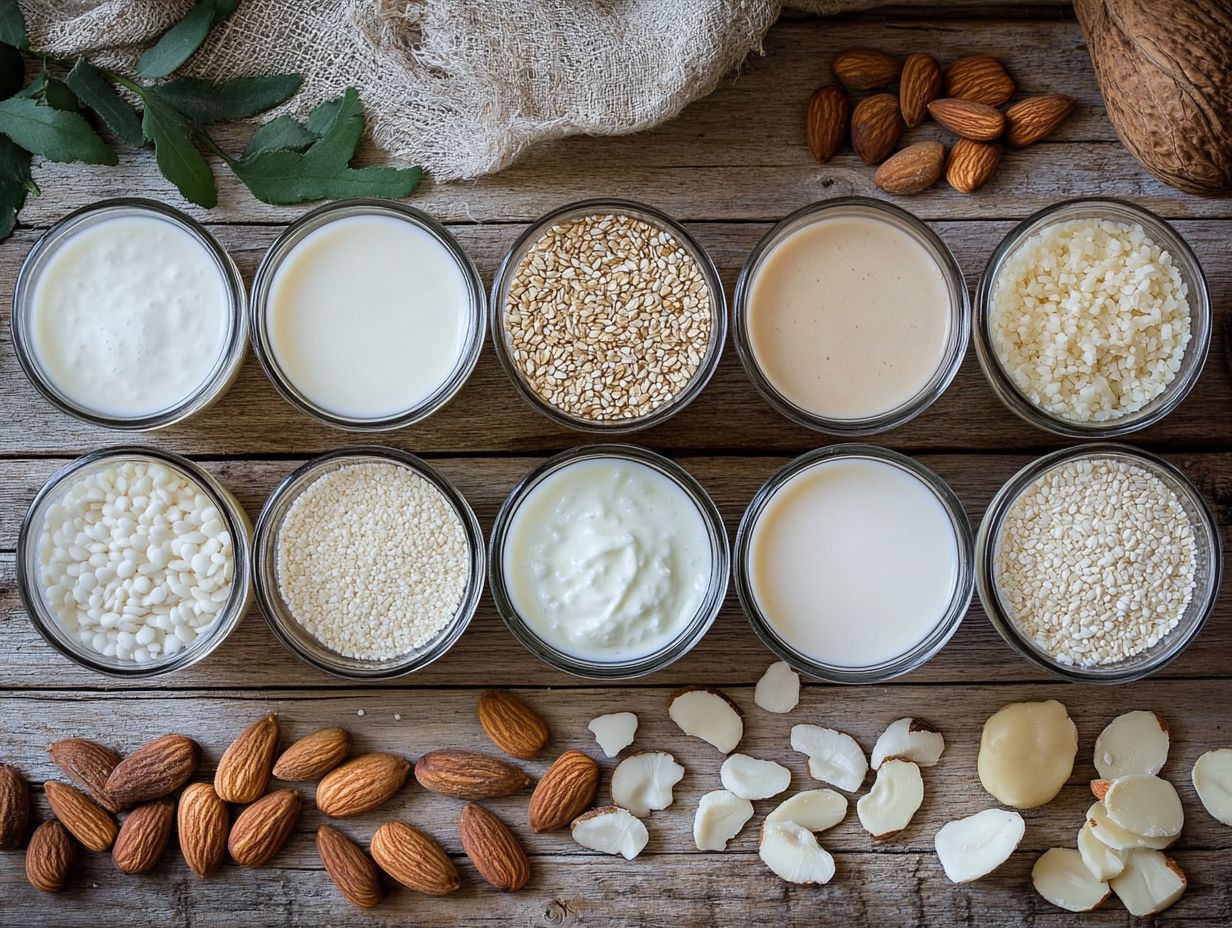
Soy milk, almond milk, coconut milk, oat milk, rice milk, hemp milk, and cashew milk are all excellent lactose-free alternatives to cow’s milk.
These dairy alternatives provide similar nutrients and can be easily added to your meals. However, some may not match the creamy texture or taste of cow’s milk.
Lactose intolerance can cause uncomfortable symptoms, but choosing lactose-free dairy alternatives can help alleviate them.
1. Soy Milk
Soy milk stands out as a popular and nutritious dairy alternative, especially for those with lactose intolerance or anyone seeking a healthier milk option.
With approximately 8 grams of protein per cup, this plant-based beverage boosts your protein intake without the cholesterol that often accompanies dairy. Often fortified with calcium and vitamin D, soy milk delivers essential nutrients that support strong bones and overall well-being.
Registered dietitian Jillian Kubala highlights these advantages. She notes that its lower calorie content compared to whole milk makes soy milk even more appealing. Isoflavones in soy milk can promote heart health, offering benefits that can outshine traditional dairy products.
2. Almond Milk
Almond milk presents a creamy, flavorful alternative to cow’s milk. It is an appealing choice for those seeking lactose-free options and plant-based milks that fit their dietary lifestyles.
Boasting an impressively low calorie count, it caters to individuals focused on weight management or those adhering to calorie-restricted diets. Furthermore, almond milk is rich in vitamin E, an antioxidant that supports skin health and overall wellness.
While it offers numerous benefits, such as being lower in saturated fat compared to traditional dairy, consider its limits before making it a staple in your diet. Its lower protein content may limit its effectiveness as a complete substitute in recipes or as a post-workout recovery beverage.
3. Coconut Milk
Coconut milk, with its rich texture and tropical flavor, stands out as a versatile dairy alternative. It is especially appreciated by those with lactose intolerance in search of delicious and healthful milk options.
This creamy liquid isn t just a treat; it offers a multitude of health benefits. One of its standout features is medium-chain triglycerides (MCTs), a type of easily digestible fat that can deliver a quick energy boost and may assist in weight loss by enhancing feelings of fullness.
Additionally, the digestive benefits of coconut milk can support gut health, thanks to its potential anti-inflammatory properties. This makes it an excellent choice for smoothies, soups, and curries, or even as a substitute for cow’s milk in baking.
You ll find that it adds a delightful and nutritious twist to traditional recipes, elevating your culinary creations.
4. Oat Milk
Oat milk has gained popularity as a creamy and wholesome dairy alternative, especially for those who are lactose intolerant. It offers a satisfying taste and smooth texture without the digestive discomfort often associated with traditional dairy.
Beyond its delightful flavor, oat milk has an impressive nutritional profile. It’s rich in fiber, which supports digestive health and promotes a feeling of fullness. This fiber can also help regulate blood sugar levels, making it a great choice for anyone aiming for a balanced diet.
Its versatility is another standout feature! You can easily add oat milk to many recipes, from smoothies to baked goods, enhancing flavor without compromising texture.
Compared to cow’s milk, oat milk usually contains less saturated fat and fewer calories, making it a heart-smart option while still providing essential nutrients. Don’t miss out on the creamy goodness of oat milk!
5. Rice Milk
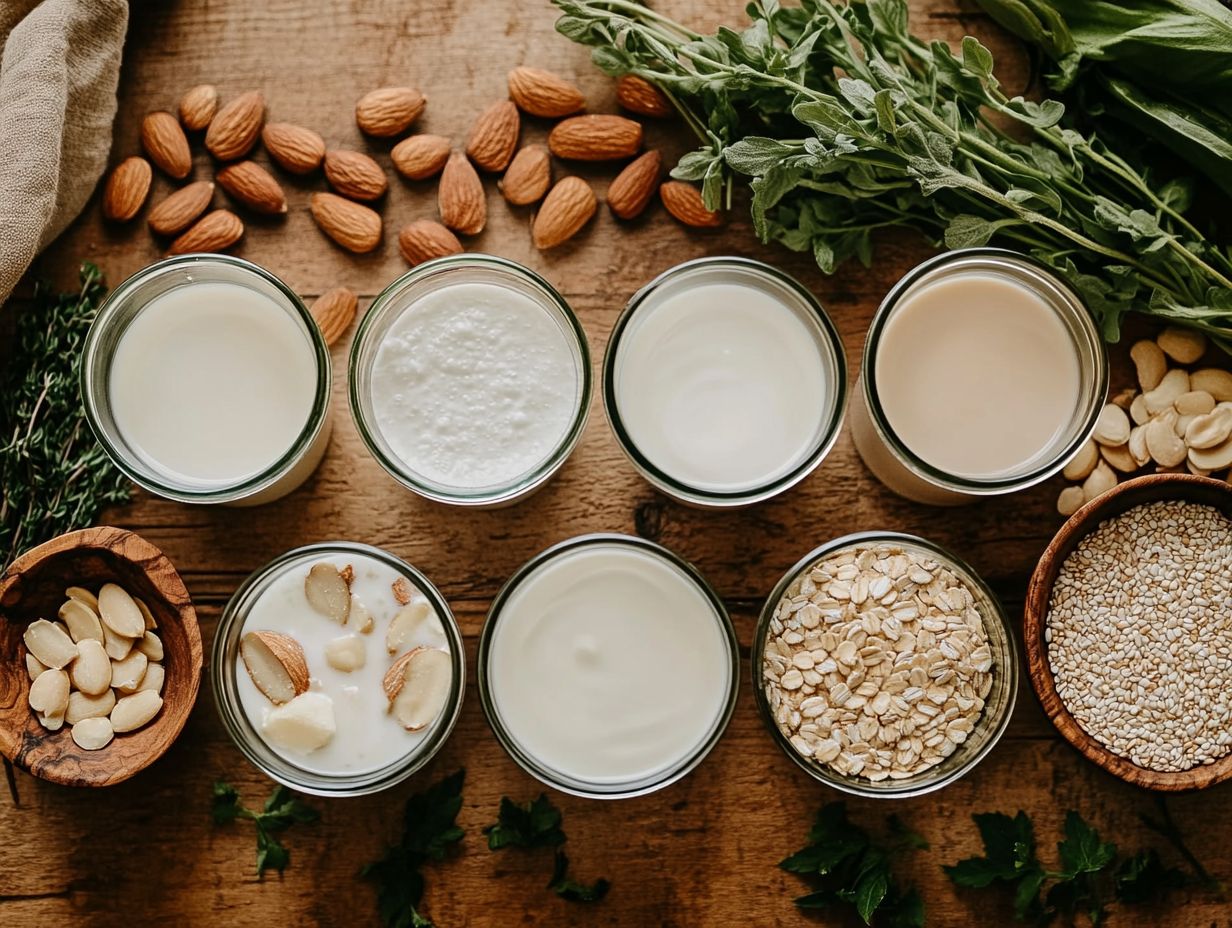
Rice milk is a light and naturally sweet dairy alternative made from milled rice. It s a fantastic lactose-free option for anyone with milk allergies or lactose intolerance looking to explore plant-based milks.
This delightful milk appeals to those seeking lactose-free alternatives and individuals looking for gentle options that minimize the risk of food sensitivities.
Rice milk typically has a lower carbohydrate content than many other dairy alternatives, like oat or soy milk, making it suitable for those monitoring their carb intake.
While it may not have the protein levels of almond or soy milk, rice milk offers a subtly sweet flavor that can elevate smoothies, cereals, or coffee. It s a versatile addition to a balanced diet!
6. Hemp Milk
Hemp milk, made from hemp seeds, is quickly becoming a favorite dairy alternative, known for its unique flavor and health benefits, especially for those with lactose intolerance.
This plant-based beverage is creamy and delightful, featuring a remarkable nutritional profile. It’s rich in omega fatty acids, especially omega-3 and omega-6, which are essential for heart health and help reduce inflammation.
The protein content in hemp milk makes it an excellent choice for anyone looking to boost their daily intake, especially if you follow a vegan or vegetarian lifestyle.
Incorporating hemp milk into your breakfast smoothies or evening recipes can significantly enhance your diet, offering a nutritious, dairy-free alternative without sacrificing flavor.
7. Cashew Milk
Cashew milk is a creamy, nutty dairy alternative that offers a luxurious texture and mildly sweet flavor. It’s an enticing choice for those with lactose intolerance seeking delicious lactose-free options.
This delightful beverage tantalizes taste buds while presenting a unique nutritional profile. Rich in healthy monounsaturated fats, cashew milk supports heart health and may help lower cholesterol levels.
Unlike other plant-based milks, like almond or soy, it has a thicker consistency that enhances creaminess, making it the perfect base for smoothies, soups, or sauces. You ll find it less watery than other alternatives, blending seamlessly into both sweet and savory dishes.
The versatility of cashew milk opens up creative culinary possibilities, and its subtle sweetness pairs beautifully with coffee, baking, and even curries. Give cashew milk a try today and elevate your recipes!
What Is Lactose Intolerance and How Does It Affect People?
Lactose intolerance is a common issue where the body doesn t produce enough lactase enzyme to digest lactose. This can lead to uncomfortable symptoms for millions.
The severity of lactose intolerance varies. It affects different age groups and ethnicities, with certain populations experiencing it more frequently.
When your body struggles to process lactose, you might encounter symptoms like bloating, gas, and diarrhea. This makes it difficult to enjoy typical dairy products.
It s important to note that lactose intolerance differs from a milk allergy, which triggers an immune system response to milk proteins and can result in severe reactions. Instead, lactose intolerance is primarily a digestive issue.
Doctors are essential in diagnosing and managing this condition. They offer guidance on alternative foods and potential lactase supplements that can help alleviate symptoms, allowing you to maintain a balanced diet without sacrificing enjoyment.
What Are the Symptoms of Lactose Intolerance?
Common symptoms of lactose intolerance include bloating, gas, diarrhea, and stomach cramps. All of these can significantly impact your quality of life and dietary choices.
These symptoms often emerge within a few hours after you indulge in dairy products. This makes it essential for you to be attentive to how your body reacts after meals.
Bloating can cause an uncomfortable fullness, while excess gas may lead to those less-than-ideal moments we all dread. Diarrhea can result in dehydration, posing additional risks to your overall health. Stomach cramps those sharp pains can disrupt your daily activities.
Doctors might recommend methods such as lactose tolerance tests, hydrogen breath tests, or elimination diets to determine if you have lactose intolerance.
Recognizing these symptoms is crucial, not just for avoiding discomfort but also for maintaining a balanced diet while effectively managing your dairy consumption.
What Are the Benefits of Choosing Lactose-Free Dairy Alternatives?
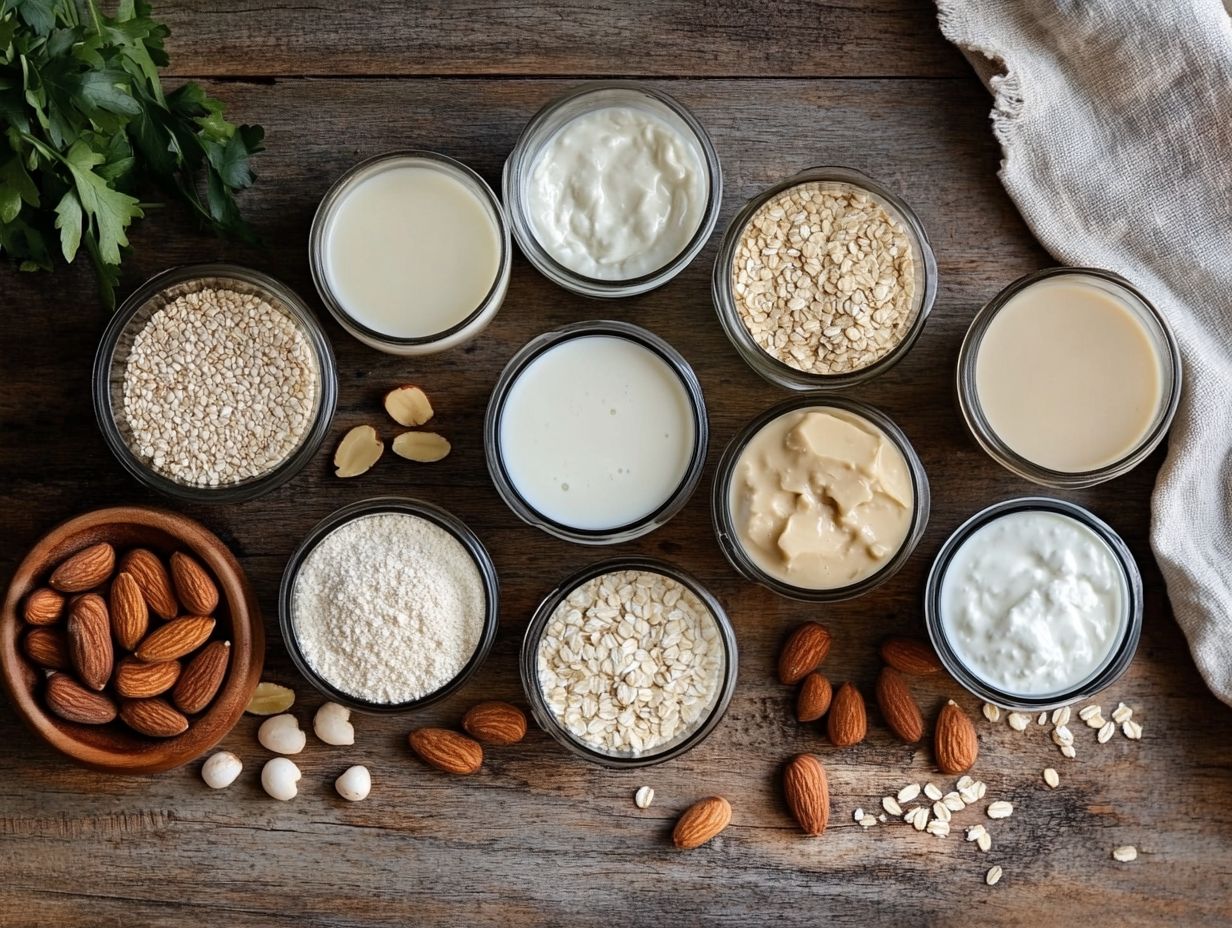
Choosing lactose-free dairy alternatives can significantly improve your well-being. You’ll enjoy better digestion and a delightful variety of options tailored to your nutritional needs.
These alternatives not only relieve discomfort but also provide essential nutrients like calcium, vitamin D, and protein.
Imagine enjoying your favorite desserts without the worry! For example, almond milk often has fewer calories but is fortified with vitamins, making it a popular choice for those looking to maintain or lose weight.
Meanwhile, soy and oat milk offer unique nutritional benefits. Soy milk is richer in protein, while oat milk provides a good dose of fiber.
Incorporating these options into your meals is easy whether you blend them into smoothies, use them in baking, or add them to savory dishes. Don’t let lactose intolerance hold you back from enjoying life!
How Do These Dairy Alternatives Compare to Cow’s Milk in Terms of Nutrition?
When comparing dairy alternatives to lactose-free cow’s milk, it s crucial to assess their nutritional makeup. Many plant-based options come with unique health benefits, yet they can vary significantly in calories, protein, and essential nutrients.
Take almond milk, for example it’s often lower in calories and fat, making it a go-to for anyone looking to manage their weight. Cashew milk, on the other hand, offers a creamier, more indulgent texture that appeals to those who savor richer flavors.
Then there s soy milk, which boasts a protein content comparable to lactose-free cow’s milk, making it an excellent choice for those aiming to maintain muscle mass or boost their protein intake.
Each of these alternatives provides distinct vitamins and minerals, such as calcium in fortified versions. This array of options allows you to make informed choices that align perfectly with your health goals.
If you suspect you have lactose intolerance, consulting your doctor can be a vital step toward managing your diet and health effectively.
What Are Some Tips for Incorporating These Alternatives Into Your Diet?
Incorporating dairy alternatives into your diet can be both effortless and rewarding. You ll enjoy a delightful array of lactose-free options that cater to your varied nutritional needs while elevating your culinary experience.
By exploring different types of plant-based milk, such as almond, oat, and soy, you can seamlessly find substitutes for cow’s milk in your recipes and beverages. These alternatives not only address the needs of those who are lactose intolerant but also introduce unique flavors and textures to your smoothies, soups, and even baked goods.
For snacks, consider swapping traditional cheese for cheese made from nuts. This enhances your nutritional profile without compromising on taste.
You can effortlessly boost your nutrition by incorporating ingredients like fortified plant milks and legumes. This allows you to enjoy a satisfying diet while embracing these versatile options.
Are There Any Drawbacks to Choosing Lactose-Free Dairy Alternatives?
While lactose-free dairy alternatives present numerous advantages, there are potential drawbacks you should be aware of. These include varying nutritional compositions and the likelihood of added sugars or preservatives in certain products.
For example, not all lactose-free options deliver the same essential vitamins and minerals found in regular dairy. This discrepancy could lead to nutritional imbalances if you rely solely on these substitutes.
Taste is another consideration. The modifications made to eliminate lactose may impact flavor and texture.
It’s essential to scrutinize labels diligently. Hidden ingredients or unnecessary additives might compromise both quality and overall health. By making informed choices about which dairy alternatives to embrace, you can ensure balanced nutrition without sacrificing flavor or wellness.
Frequently Asked Questions
What Are the Top 7 Lactose-Free Dairy Alternatives?
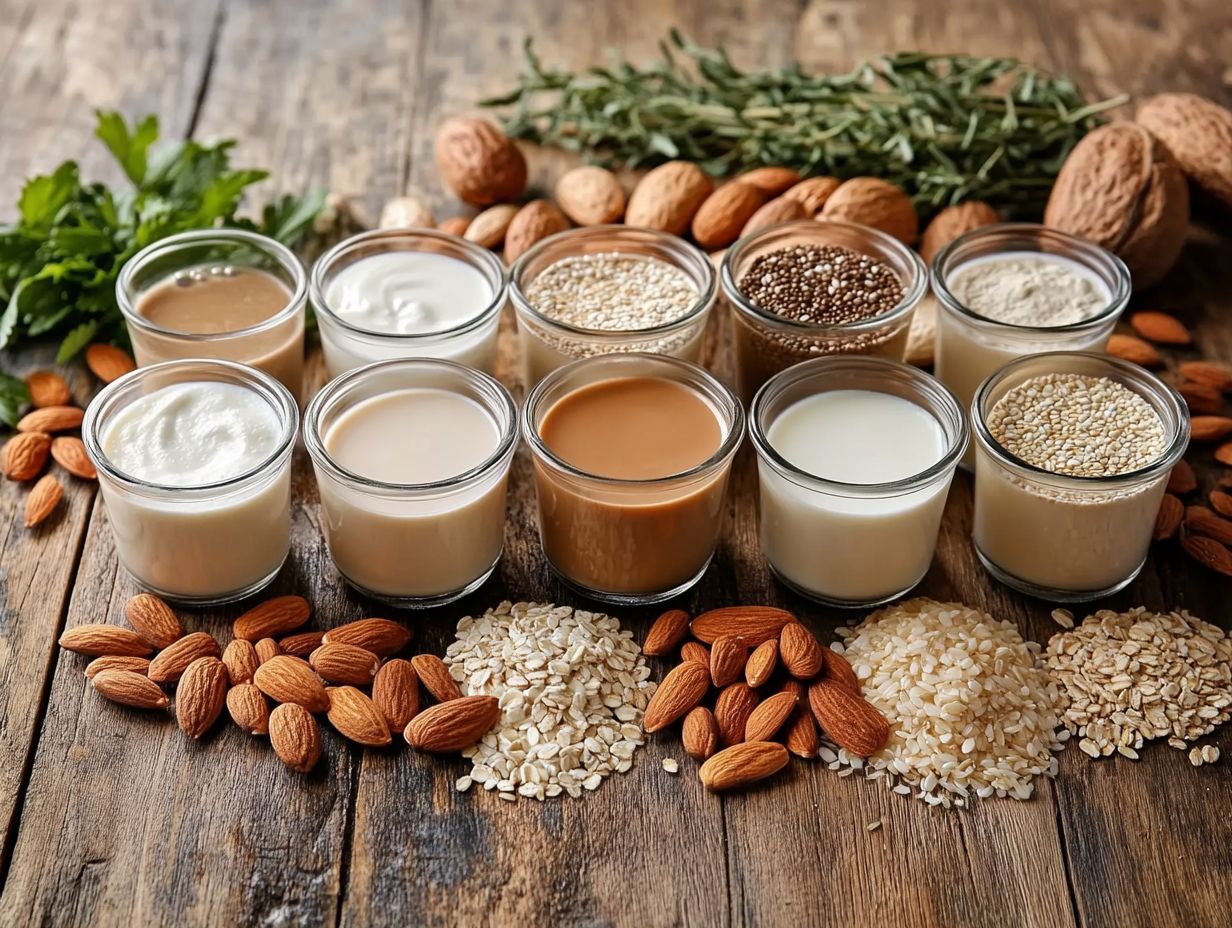
The top 7 lactose-free dairy alternatives include almond milk, coconut milk, oat milk, soy milk, rice milk, cashew milk, and hemp milk.
What Is Lactose Intolerance and Why Do People Choose Lactose-Free Dairy Alternatives?
Lactose intolerance is the inability to digest lactose, a type of sugar found in dairy products. People choose lactose-free dairy alternatives because they experience uncomfortable symptoms like bloating, gas, and diarrhea when consuming dairy products.
Are Lactose-Free Dairy Alternatives Suitable for Vegans?
Yes, most lactose-free dairy alternatives are suitable for vegans as they are plant-based and do not contain any animal products. However, it is important to check the ingredients label because some products may contain additives that are not suitable for a vegan diet.
Can Lactose-Free Dairy Alternatives Be Used in Cooking and Baking?
Yes, lactose-free dairy alternatives can be used in cooking and baking as substitutes for regular dairy products. They can be used in the same way as regular dairy, but keep in mind they may have a slightly different taste or consistency.
Are Dairy Alternatives a Healthier Choice for You?
Lactose-free dairy alternatives can be a healthier option for those who are lactose intolerant, as they avoid uncomfortable symptoms associated with consuming dairy products. However, choose options fortified with calcium and other essential nutrients to ensure a well-balanced diet.
Are Lactose-Free Dairy Alternatives More Expensive Than Regular Dairy Products?
It depends on the brand and type of lactose-free dairy alternative. In some cases, they may be slightly more expensive, but there are also affordable options available. It is important to compare prices and choose what fits within your budget.
Start your journey to a tastier, healthier diet today!



